The Best and Worst Books I Read in 2022
The Best
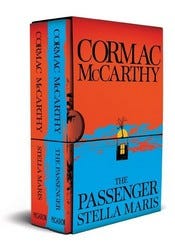
Cormac McCarthy, The Passenger/Stella Maris
A salvage diver (Bobby Western) is sent to investigate a plane at the bottom of the ocean. Somehow the plane is intact and one of the passengers is missing. When he gets back, shadowy government agents are after him. Western is also a genius mathematician and a racing car driver. This is a potboiler!
On the other hand we have the deranged visions of his sister, in a Pynchonian absurdist mode. The thriller plotline is quickly abandoned, and the rest of the novel plays out mostly in a series of conversations. Mathematics, physics, the atomic bomb, JFK assassination conspiracy theories, the role of the unconscious: this is a novel of ideas in many ways. At the same time it's deeply romantic, filled to the brim with longing, regret, loss, and love. It's an incredibly sad book.
Overall this is a novel that strikes out in many directions, many times in unsatisfying and imprecise and undisciplined ways, but it somehow achieves an effect. "Blaze paths into the unknown" etc. To the usual McCarthyan mix of Hemingway and Captain Ahab, he now adds heavy doses of Pynchon and DeLillo.
Perhaps the passenger is the conscious, or the unconscious, or they're both passengers (probably all of the above).
The second novel is a series of conversations between Bobby's sister Alicia and her psychiatrist, a short time before she commits suicide. It's mostly a companion piece, and many times it feels like Alicia is McCarthy's mouthpiece. It's about mathematics and giving up mathematics and the foundation of mathematics, about language, about meaning in a godless world, about the inability to experience the world directly and the effects of various intermediation mechanisms (including language), about love and longing, about the burden of knowledge, about intelligence, evolution and evolutionary psychology, physics and the bomb and the sins of the father. Both books try their damnest to tackle Gnosticism.
One of the best works in many years, I can't wait to go back to it.
Here is a story. The last of all men who stands alone in the universe while it darkens about him. Who sorrows all things with a single sorrow. Out of the pitiable and exhausted remnants of what was once his soul he’ll find nothing from which to craft the least thing godlike to guide him in these last of days.
Cantor, Gauss, Riemann, Euler. Hilbert. Poincaré. Noether. Hypatia. Klein, Minkowski, Turing, von Neumann. Hardly even a partial list. Cauchy, Lie, Dedekind, Brouwer. Boole. Peano. Church is still alive. Hamilton, Laplace, Lagrange. The ancients of course. You look at these names and the work they represent and you realize that the annals of latterday literature and philosophy by comparison are barren beyond description.
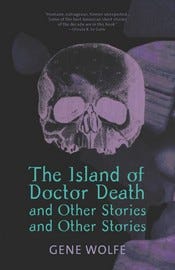
Gene Wolfe, The Island of Doctor Death and Other Stories and Other Stories
Slightly uneven but the best stories are really great: in particular I loved Feather Tigers, Death of Dr. Island, Toy Theater, and Seven American Nights. Loads of classic Wolfeian mindfuckery. Many of the stories are in that classic Wolfe style where you have to piece together what's going on from tiny hints left in the text, and it's all a bit ambiguous in the end and so on. There's a lot of focus on religion (often explicitly Christian) and death. Two stories, The Hero as Werwolf and The Doctor of Death Island, being fairly explicitly death-ist. Technology and its social effects, the problem of evil, mastery of art versus human relations, the hollowness of immortality, how people would react to a messianic figure, and more!
An exaggerated and solemn respect always indicates a loss of faith.
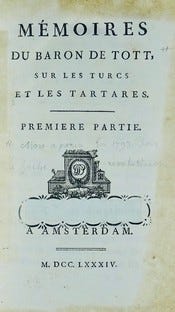
François, Baron de Tott, The Memoirs of the Baron De Tott, on the Turks and the Tartars
A look into the past, from the past. Filled with fascinating little observations (I found the book through an anecdote about forks which Braudel mentions in C&C). Roughly at the time the American revolution was happening, the same time when Johnson and Boswell were drinking too much claret at the Mitre, de Tott was joining the Crimean Tatars on a slave raid into Southern Russia. He spent many years in the Ottoman empire over two stints, and finally also traveled around the middle east. Most fascinating for its observations of Ottoman society, and the role de Tott played in the Russo-Turkish war of '68-'74. Somewhat niche, but definitely worth a read if this is your kind of thing.
What causes the fall of empires? Culture, Tott says: all decay ultimately comes from within. He's particular critical of the effects of despotism in government: everyone's place is precarious and there is no room for prosocial ambition. Simultaneously totally lawless but also extremely despotic—anarcho-tyranny at its finest, made worse by abitrary and capricious system of punishments.
Oh, and the introduction by the translator is absolutely hilarious (unintentionally).
How can so Sovereign a contempt for human nature amongst the Turks consist with that whimsical beneficence they display towards certain animals the most useless to fociety? Barbarity itself, no doubt, stands in need of some relaxation, whilst it crushes mankind under the weight of its iron secptre, it condescends to smile on objects whole insignificance give no occasion for alarm; and the pride of the despot blending all beings together in one common Contempt, selects its favourites from amongst the weakelt.
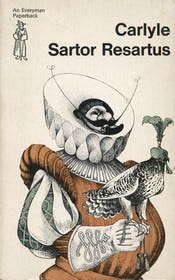
Thomas Carlyle, Sartor Resartus
A review of a fictional philosophical tome on clothing, with various notes on the life of its author, the also fictional Diogenes Teufelsdröckh. Imagine a mix between Borges, Laurence Sterne, and Fichte. And it's got Carlyle's ridiculous style (which was extreme even in his own time) to top things off. And you can almost never tell when it's serious and when it's not. This book caused Emerson to start corresponding with Carlyle, and even inspired Borges to learn German!
In Sartor Resartus, only a lifelong quest for knowledge can lead one to the truth that knowledge is unattainable (or perhaps the other way around?). Carlyle hates the limiting effect of the standard philosophical approaches of his time, so he instead opts for this extreme type of illegible, non-linear anti-discourse in which everything is both deadly serious and potentially an ironic joke. What I'm saying is that Carlyle was the first zoomer.
The age of Curiosity, like that of Chivalry, is indeed, properly speaking, gone. Yet perhaps only gone to sleep: for here arises the Clothes-Philosophy to resuscitate, strangely enough, both the one and the other! Should sound views of this Science come to prevail, the essential nature of the British Dandy, and the mystic significance that lies in him, cannot always remain hidden under laughable and lamentable hallucination. The following long Extract from Professor Teufelsdröckh may set the matter, if not in its true light, yet in the way towards such. It is to be regretted however that, here as so often elsewhere, the Professor’s keen philosophic perspicacity is somewhat marred by a certain mixture of almost owlish purblindness, or else of some perverse, ineffectual, ironic tendency, our readers shall judge which
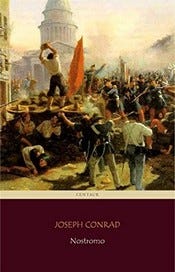
Joseph Conrad, Nostromo
To say that it's about a dockworker would be both true and misleading. Nostromo is the dashing Capataz de Cargadores, a man obsessed with his image and driven to heroic tasks out of a desire to maintain it.
A chopped-up story from various points of view, the narrative is kaleidoscopically structured: fragmented, unclear, conflicting, and circular. Character motivations and world-views clash with each other as the fate of Costaguana is determined. Politics, heroism, revolt (internal and external), the worth of social status, reputations, perceptions, allegiances, and material vs idealistic interests. Betrayals of all kinds. Private and public vindications and redemptions. Great stuff.
To be a millionaire, and such a millionaire as Holroyd, is like being eternally young. The audacity of youth reckons upon what it fancies an unlimited time at its disposal; but a millionaire has unlimited means in his hand—which is better. One's time on earth is an uncertain quantity, but about the long reach of millions there is no doubt.
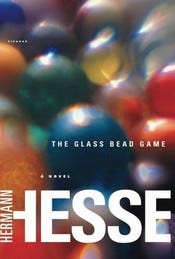
Hermann Hesse, The Glass Bead Game
A story set in a future in which a cloistered religious-academic order is devoted to playing the Glass Bead Game, a kind of unification of all the arts and sciences. A kind of nihilistic telos for all intellectual pursuits, with an alluring beauty all of its own. The actual game itself is never described; instead we follow the life of Joseph Knecht from student, to leader of the order, and the next steps after that, as he is torn between the real world and the ivory tower.
The Borges influence can be felt throughout, and there's nothing quite like it.
The life of the mind, asceticism, the lifecycle of organizations, hierarchies and servitude, purpose and nihilism, beauty, sacrifice, duty, transcendence.
Especially for young men with gifts like those of Joseph Knecht, who have not been driven by a single talent to concentrate on a specialty, but whose nature rather aims at integration, synthesis, and universality, this springtide of free study is often a period of intense happiness and very nearly of intoxication. Were it not preceded by the discipline of the elite schools, by the psychic hygiene of meditation exercises and the lenient supervision of the Board of Educators, this freedom would even be dangerous for such natures and might prove a nemesis to many, as it used to be to innumerable highly gifted young men in the ages before our present educational pattern was set, in the pre-Castalian centuries. The universities in those days literally swarmed with young Faustian spirits who embarked with all sails set upon the high seas of learning and academic freedom, and ran aground on all the shoals of untrammeled dilettantism. Faust himself, after all, was the prototype of brilliant amateurishness and its consequent tragedy.

Laurent Binet, HHhH
Himmlers Hirn heißt Heydrich. The story of Operation Anthropoid (to assassinate Reinhard Heydrich in Prague) and everything that led up to it. 257 short chapters, sometimes consisting of nothing more than a quotation. It's a blend of a mostly-historical retelling of the operation with a ton of metafictional elements on top. Binet constantly comments on the issues with constructing a historical novel, compares his approach to other books and movies, and even brings his personal life into it. Irony, humor, self-consciousness (especially about the author's view of Heydrich), the tension between history and fiction, and a slow, horrific build-up that absolutely fills you with terror. Incredible that this book can manage such a powerful emotional effect despite the ironic tone. The absurd scenes (whether comical or horrific) are true, which makes the whole thing so strange. Goring is showing off his model train set to Heydrich when he's there to get the final solution started...
Anyway, the RSHA hydra has enough heads to keep him busy. So now he has to delegate. He gives each of the RSHA’s seven divisions to a colleague who is selected first and foremost for his abilities rather than his politics—and this is rare enough to be worth mentioning in the lunatic asylum that is the Nazi regime. Heinrich Müller, for example, who is put in charge of the Gestapo—and who identifies so completely with his job that hereafter he is known simply as “Gestapo” Müller—is a former Christian Democrat: an affiliation that does not prevent him from becoming one of the Nazis’ most devastating weapons. The other RSHA offices are given to brilliant intellectuals: youngsters such as Ohlendorf (Inland-SD) and Schellenberg (Ausland-SD), or experienced academics like Six (Written Records). Such men contrast strongly with the cohort of cranks, illiterates, and mental degenerates who populate the Party’s higher echelons. One minor branch of the Gestapo—a status that does not reflect its true importance, but it’s always better to remain discreet with such sensitive subjects—is devoted to Jewish affairs. Heydrich already knows who he wants to run it: that little Austrian Hauptsturmführer who did such good work before, Adolf Eichmann.

Gustave Flaubert, Bouvard and Pecuchet
It's difficult to write anything about this bizarre, unfinished novel. Despite being comic or satirical, it's never really funny. It's extraordinarily repetitive. There are really no characters, no plot, no development of any sort. And yet it's a powerful commentary on the tragedy of the human quest for knowledge. With it, Flaubert renounced all his earlier technique and essentially inaugurated the 20th century (post-)modernist tradition in literature. I can't really recommend it, but it's a unique masterpiece.
They no longer had a single fixed idea about the individuals and events of that time. To form an impartial judgment, they would have to read every history, every memoir, every newspaper and manuscript, for the slightest omission could foster an error that would lead to others, and on unto infinity. They gave up. But they had acquired a taste for history, a need for truth for its own sake. Perhaps the truth was more easily uncovered in earlier periods? Surely the authors recounted events more dispassionately at a greater remove. And they delved into the good Rollin. “What a load of hogwash!” cried Bouvard as of the first chapter.

Alexis de Tocqueville, Democracy in America
Here's a book that manages to entirely live up to its reputation. Parts of it can be a slog, but it's filled with great observations on psychology, sociology, economics, politics, law, the future of America, and more. Tocqueville's analysis of the pressures of social conformity prefigure the (great) work of Timur Kuran.
Fascinating both for how it reveals how things have changed, and how they have stayed the same.
The Americans of the United States must inevitably become one of the greatest nations in the world; their offspring will cover almost the whole of North America; the continent that they inhabit is their dominion, and it cannot escape them. What urges them to take possession of it so soon? Riches, power, and renown cannot fail to be theirs at some future time, but they rush upon this immense fortune as if but a moment remained for them to make it their own.
The Worst

David Deutsch, The Beginning of Infinity
An unstructured mishmash of warmed-over pop science and a cavalcade of bad arguments around abduction, philosophy of science, intelligence, infinity, qualia, etc.
The arguments about superhuman general intelligence not being possible because humans are universal Turing machines are utterly absurd.
One of the worst treatments of abduction in the history of philosophy, and that's really saying something.
Deutsch's comments on heritability are downright idiotic, and it's clear that he didn't even bother spending 30 seconds reading the wikipedia page. He just makes stuff up (incorrectly). A lot of uppity commentary about shit he doesn't understand.
And then it's just filled with a whole bunch of random shit, like a galaxybrained theory of why the UK has the best voting system, a terrible theory of aesthetics, etc.
Qualia are currently neither describable nor predictable — a unique property that should make them deeply problematic to anyone with a scientific world view (though, in the event, it seems to be mainly philosophers who worry about it).
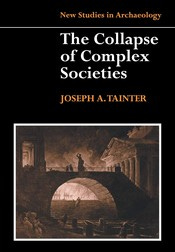
Joseph Tainter, The Collapse of Complex Societies
Tainter's theory mostly comes down to decreasing marginal returns to additional societal complexity, which eventually leads to collapse. Parts of it are highly reminiscent of Chaisson's Energy-Rate Density paper (which everyone should read), but much more limited in scope. He's too focused on explaining everything with a single theory, leaving little room for contingency in history. He ignores the aspect of time: just because a system works well for 10 years does not mean it can work for 1000. And he treats rulers as being virtually unconstrained in their policy choices.
Ultimately I just found it badly argued and completely unconvincing. Full review.
In the evolution of a society, continued investment in complexity as a problem-solving strategy yields a declining marginal return.

Tad Williams, City of Golden Shadow
Absurdly overlong scifi story about virtual realities and sinister conspiracies. There's a series of parallel fantastical stories set in a virtual reality and they're all pointless and awful. After 800 pages there is no resolution, only sequelbait. A bit outdated in terms of how it imagines the internet, it does have a few interesting ideas but overall not worth the effort at all.
Ho! We are being taunted by some sort of otherworldly fireflies. Someone fetch me my rifle!


